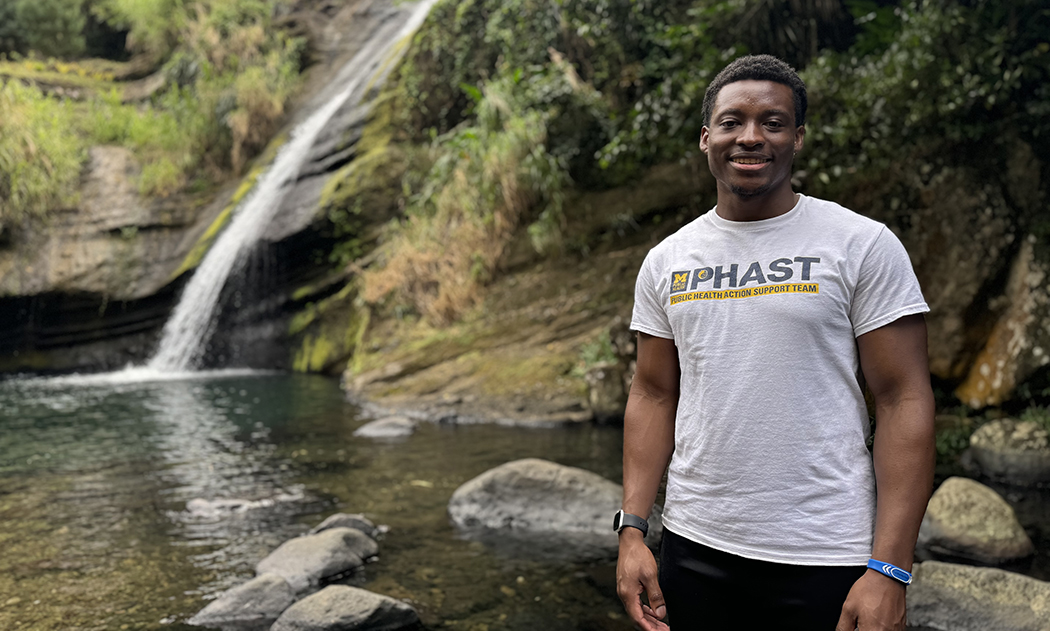Transforming public health education through public engagement

Darius Moore, MPH ’24
Health Behavior & Health Equity
In a field that relies on teamwork, Darius Moore, MPH ’24, has been recognized as an outstanding teammate.
Moore was named the School of Public Health Rising Star shortly before he graduated with a Master of Public Health in Health Behavior and Health Education in May 2024.
The award is presented annually by the University of Michigan School of Public Health to an emerging student organization leader who has made significant contributions to an organization, and has demonstrated vast potential for continued enrichment in public health
A dynamic student leader for Public Health Students of African Descent (PHSAD), Moore played a vital role in fostering the organization’s significant presence within Michigan Public Health.
Moore’s scholarship includes collaborating closely with Gary Harper, professor of Health Behavior & Health Equity, on pivotal research focusing on gay and bisexual men in Kenya, addressing critical issues within this community. His involvement extends to groundbreaking HIV prevention research, with profound implications for those at heightened risk of HIV infection.
LEARN MORE about Michigan Public Health.
“Mentorship and collaboration are crucial for growth,” Moore said. “They shape our ability to address public health challenges effectively. My goal is to create practical, scalable solutions that improve health outcomes for underserved populations.”
Recognized for his advocacy, particularly for people of color, Moore has been instrumental in leading seminars and conferences during his tenure at Michigan Public Health. Now a doctoral student in Health Behavior & Health Equity at Michigan Public Health, his work in HIV prevention has solidified his status as an exceptional individual poised to make a lasting impact.
The coursework in his master’s program included theories and methods essential for public health practitioners. It was the application of this knowledge that truly captivated Moore.
Mentorship and collaboration are crucial for growth. They shape our ability to address public health challenges effectively. My goal is to create practical, scalable solutions that improve health outcomes for underserved populations.”
“The crux of public health is actual practice,” he said. “I wanted to translate classroom knowledge into real-world action.”
Moore did that by participating in local and international projects in the Dominican Republic and Kenya, offering him hands-on experience in community engagement.
“In the classroom, we focus on theories and data,” he said. “But when interacting with community members, we often have to shift our approach to be more accessible and practical.”
READ MORE about faculty, students, alumni and staff.

As a member of the Public Health Action Support Team (PHAST), Moore traveled to the Caribbean nation of Grenada over spring break in February 2024. He joined 14 classmates as they worked on three projects.
Moore’s team was assigned to help the Grenada Red Cross Society create a voluntary blood donation system by studying local perceptions through community surveys and interviews. They engaged with residents in everyday locations such as spice markets, schools and police stations to understand their concerns and motivations regarding blood donation. Another team focused on Alzheimer’s and dementia care while the other group worked on creating a disabilities affairs unit.
THE PURSUIT: Read Darius Moore's firsthand account of donating blood in Grenada.
Moore’s experiences highlighted the need to adapt academic concepts to real-world scenarios.
“Community members understand theories in their own way, based on their experiences,” he said.
Moore thrived in these diverse settings, learning to navigate the complexities of public health challenges in Grenada. His role involved conducting key informant interviews, developing educational programs and assessing community needs. These experiences reinforced the importance of collaboration across various public health disciplines.
The [department's] name change reflects what we were already doing—centering equity in all aspects of public health practice and research.”
Upon completing his master’s degree, Moore transitioned to the PhD program within the Department of Health Behavior & Health Equity. (The Department of Health Behavior and Health Education was renamed on August 15, 2024, to reflect its increasing focus on issues of health equity in research, teaching and service.) This next step allows him to delve deeper into research and expand his impact on public health.
“The PhD program provides a platform to explore issues of health equity and develop solutions that are both innovative and grounded in community needs,” Moore said. “Equity has always been at the center of my work.
“The name change reflects what we were already doing—centering equity in all aspects of public health practice and research.”
SUPPORT research and engaged learning at Michigan Public Health.
Throughout his experience at the University of Michigan, Moore, who earned a bachelor's degree in Biology from the College of Literature, Science, and the Arts, has appreciated the interdisciplinary nature of his education. Working with peers from different public health disciplines has enriched his understanding and approach to complex health issues.
“Our diverse team dynamics allowed us to play to each other’s strengths and fill in knowledge gaps,” said Moore, emphasizing his team-first mentality.
Spoken like a true Rising Star.
